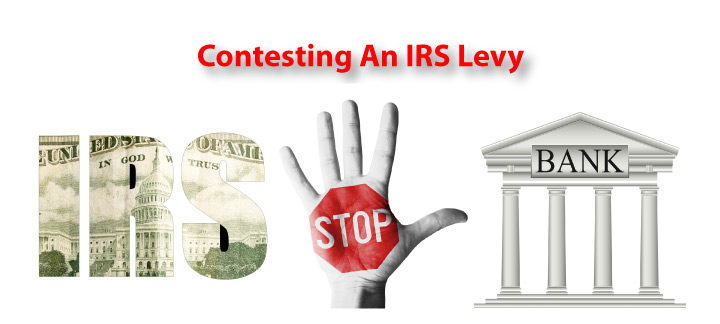Contesting an IRS Levy
The US government has given the IRS incredible power to both determine the amount of taxes you owe and to perform tax collections. The good news is that you are not powerless. In this article we will take a look at IRS levies and what you can do to defend yourself by contesting them.
What is an IRS Levy?
The IRS has the power to levy a taxpayer’s property or bank accounts for unpaid taxes. By law, the IRS is required to notify you the first time it collects or intends to collect a tax liability by taking your property or rights to property. If the IRS decides to levy your bank accounts, you will receive a Final Notice of Intent to Levy and Notice of Your Right to a Hearing, otherwise known as a levy notice. When you receive a levy notice from the IRS, the IRS may levy your assets 30 days after the date of the levy notice.
Can I Contest an IRS Levy?
Yes, there are a number of ways in which a taxpayer may contest an IRS Levy. The two main methods of contesting an IRS levy are Collection Due Process (CDP) and the Collection Appeals Program (CAP).
How is Collections Due Process Used to Contest an IRS Levy?
Under section 6330 of the Internal Revenue Code, taxpayers have the right to a due process hearing before the deprivation of their property. In the case of an IRS levy, taxpayers have the right to a hearing in United States Tax Court within 30 days of receiving any kind of IRS levy notice for each tax assessment within a tax period. During the 30 day period from receiving the levy notice, the taxpayer may request a hearing before the levy takes effect. Even if you miss the deadline to request a hearing, an equivalent hearing may still be available to you. To request a hearing after the 30-day period from receiving the levy notice, you must postmark your request on or before the end of the one-year period after the date of the levy notice or on or before the end of the one-year period plus 5 business days after the filing date of the Notice of Federal Tax Lien.
How is the Collections Appeals Program Used to Contest an IRS Levy?
Under the Collections Appeal Program, you may contest an IRS levy before or after the IRS places a levy on your bank account or other property. If the levy has taken effect and the levy proceeds have already been sent to the IRS, you may still appeal the denial by the IRS of your request to have levied property returned to you. However, the request to have levied property returned to you must be made within 9 months of the date of the levy. One advantage of the Collections Appeals Program is that it often results in a quicker appeals decision. The downside to the Collections Appeal Program is that no judicial remedies are available to those who participate in the program and disagree with the final result.
How Can a Tax Attorney Help Contest an IRS Levy?
An experienced tax attorney can help you decide which method to use in contesting your IRS levy. When you receive a levy notice from the IRS, you must act quickly to prevent your bank accounts or other assets from being levied by the IRS. The two methods of contesting the levy are slightly different, and you can benefit from the knowledge of a tax attorney in determining which method works best for your needs. If you have received a levy notice, or have already had property levied by the IRS, you should seek the advice of a tax lawyer immediately.
The Tax Lawyer - William D Hartsock has been successfully helping clients put a stop to collection actions such as IRS levies since the early 1980's. Mr. Hartsock offers free consultations with the full benefit and protections of attorney client privilege to help people clearly understand their situation and options based on the circumstances of their case. To schedule your free consultation simply fill out the contact form found on this page, or call (858)481-4844.



Comments (0)